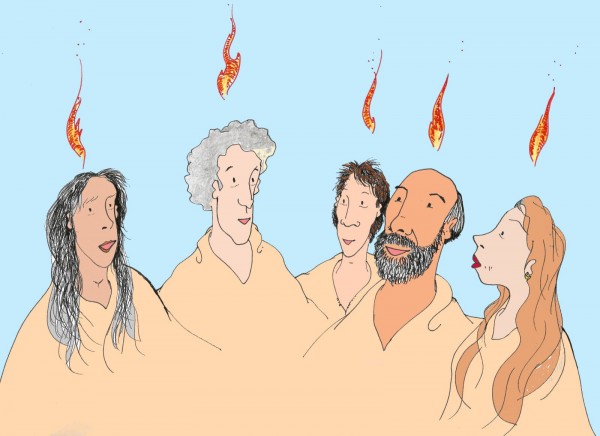
In the story of Pentecost that Luke offers us in the book of the Acts of the Apostles (Acts 2: 1-11), the absolute liberality with which the Holy Spirit pours itself over the disciples is striking. Over all the disciples. The Spirit is indeed abundant and splendid. The text states that the tongues of fire “rested on each of them” (that is, without avoiding or eluding anyone), and then it insists: “All of them were filled with the Holy Spirit.”
The Spirit is not stingy, it is not selective, and it is not elitist. The Spirit ignores hierarchies, teaching us, incidentally, that they are always a human construction.
Let's imagine, for a moment, an alternative text:
“On the day of Pentecost, they were all together in one place. And suddenly from heaven there came a sound like the rush of a violent wind, and it filled the entire house where they were sitting. Divided tongues, as of fire, appeared and began to flutter above the disciples looking for the most capable, those who were in command of the group, the smartest, the best, and then settled on them. The three or four lucky ones were filled with the Holy Spirit and began to speak in foreign languages, while the others congratulated them, a little disappointed and secretly envious, because they had not been worthy of receiving a tongue of fire.”
This fictional text, which Luke did not write, would tell us about a Spirit that would reconfirm human hierarchies and which would only be given, with much caution, to a few; perhaps to those who would have shown that they would use well the gift received.
And yet, this is not the text that Luke left us. In his, in the authentic, the tongues of fire rest on each and every one of those present, and the Spirit inspires all of them, without exception. We can guess that there were brave disciples and fearful disciples in that room; men and women; young and old; smart disciples and others less brilliant; talkative and reserved; audacious and hesitant; vigorous and tired ... as in any human group. And the Spirit came to all, and all were filled with it.
Our human categories (those with which we look at each other, assessing the successes of some and underlining the mistakes of others, applauding achievements and pointing out failures, looking for skills and marginalizing those we suspect are plagued by defects) should never obscure the fact of that, on Pentecost, the Spirit was not deceived by any elitism of this sort, nor by any hierarchy, and was given, with confidence and freely, to all those who were gathered.
It is startling, in fact, that a Church that was born in such a way ended up so concerned, in her later history, about establishing a strongly hierarchical model, thus imitating the vast majority of human institutions. This is a fact that speaks more about our resistances to the breath of the Spirit than of our docile adherence to its impulse. It would even seem that, at times, the Church has tried to reflect something similar to the fictional text that we have imagined instead of trying to live the reality of the authentic text.
The community desired by the Spirit, in short, is not one in which a few are granted the right to speak in the name of God, while others have to keep silent, listening and agreeing. The Church that is born in Pentecost is the one that celebrates that the Spirit of God has rested on each of its members, without discriminating against anyone, inspiring them all. It is the community in which “all of them began to speak in other languages, as the Spirit gave them ability.” It is the Church that celebrates with joy the audacious generosity of God.









